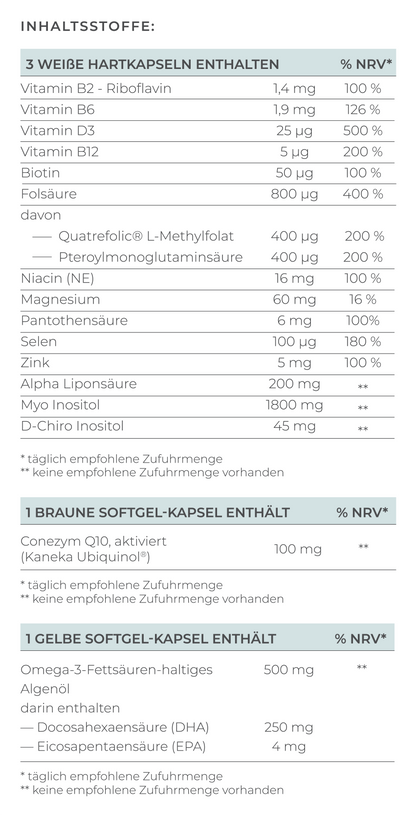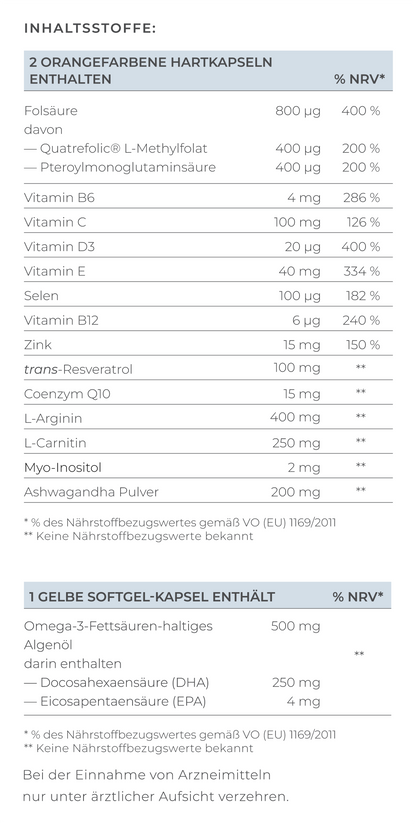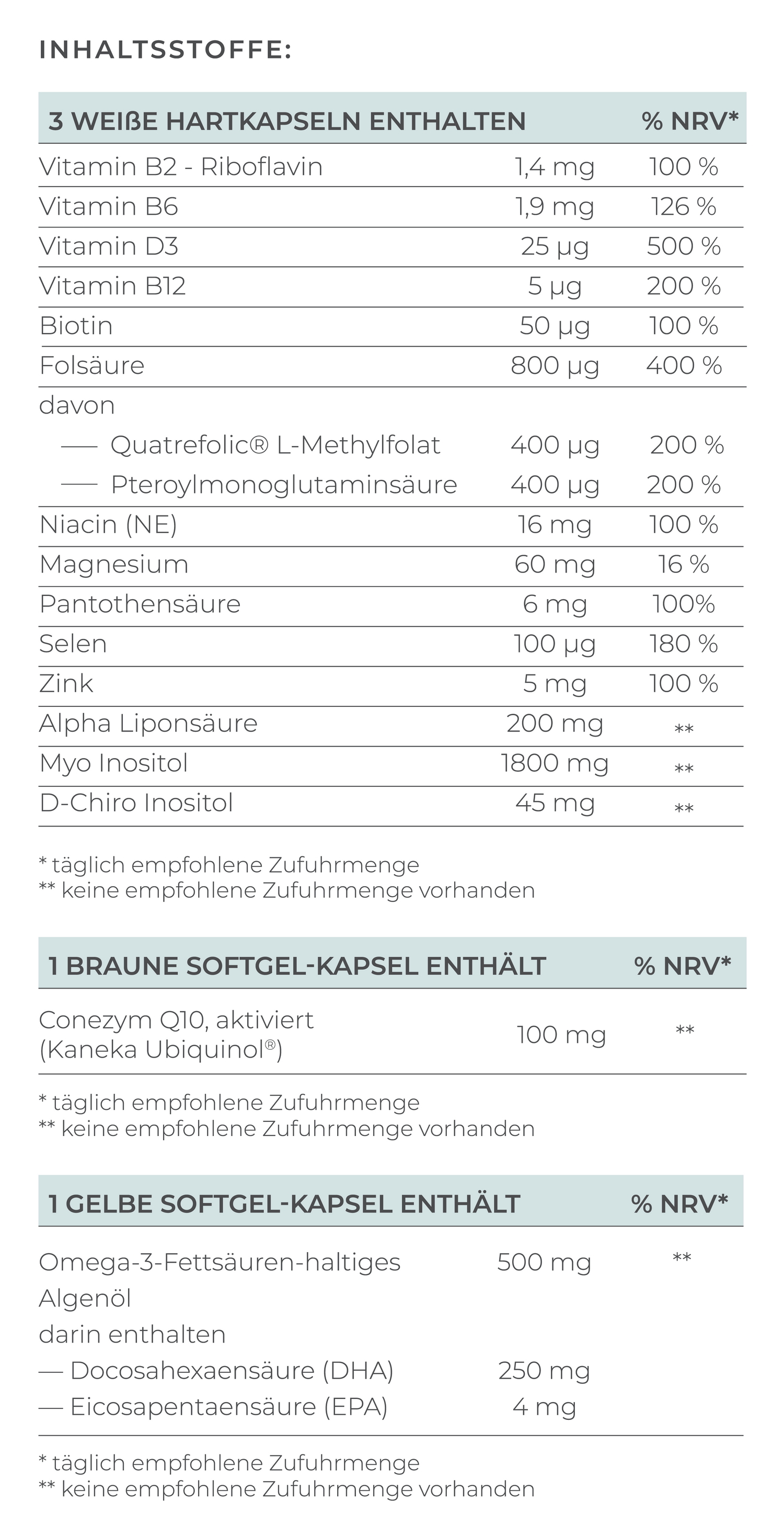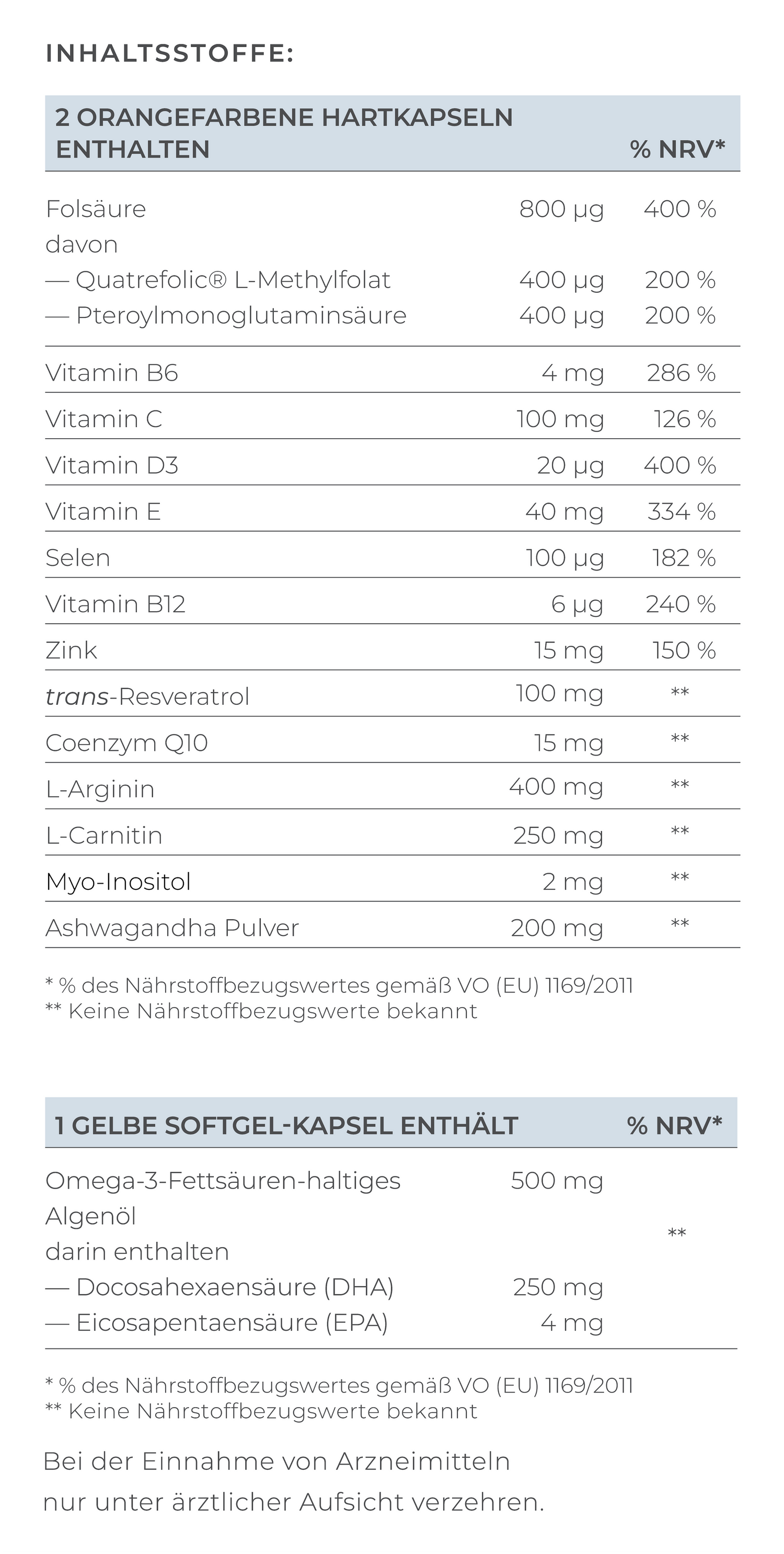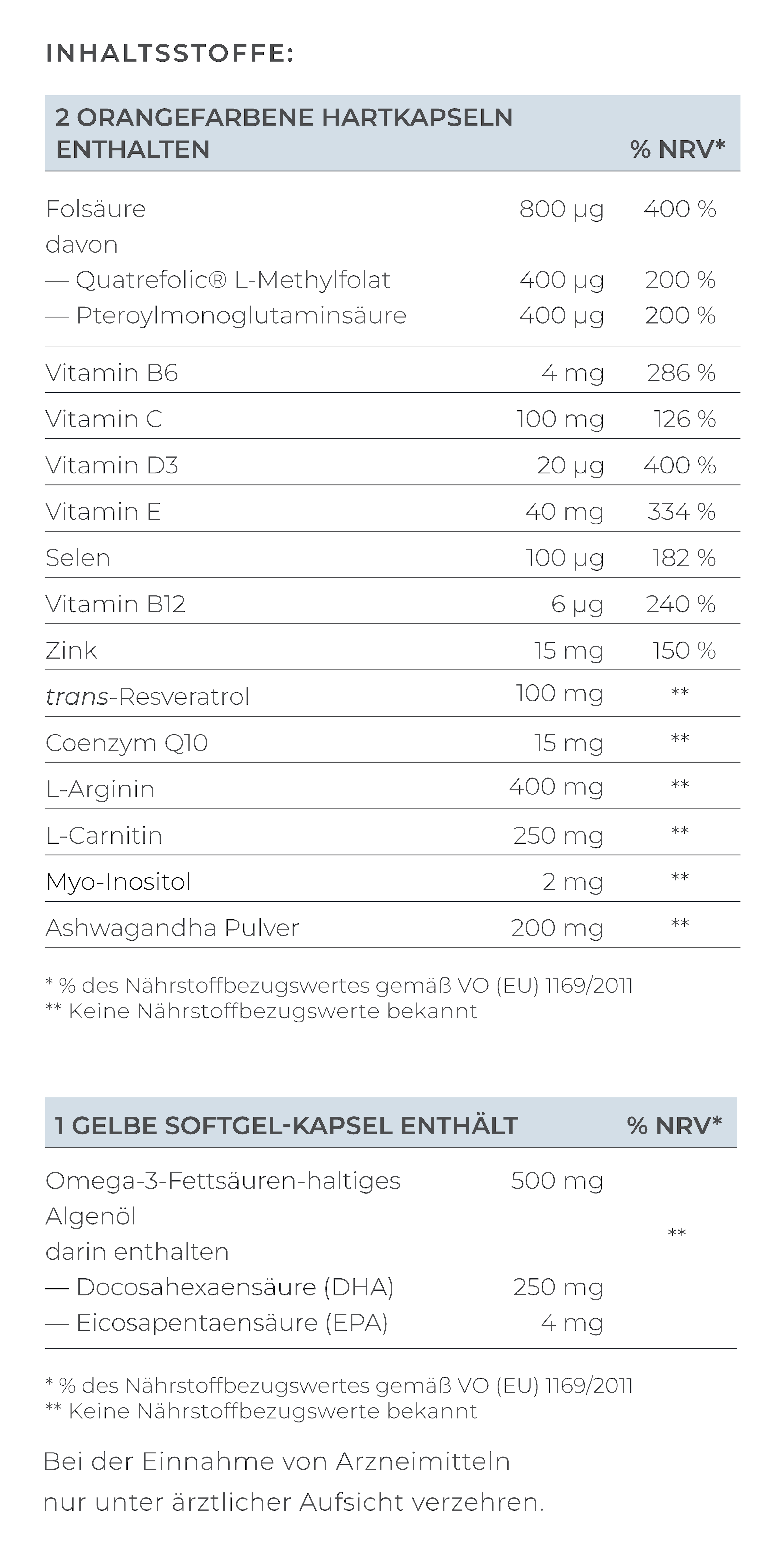The Most Important Points about Body Weight and Fertility at a Glance:
- Both overweight and underweight can affect fertility in men and women.
- A BMI over 25 indicates overweight, and over 30 indicates obesity.
- In women, overweight can disrupt hormonal balance and prevent ovulation.
- Overweight can increase the risk of PCOS, lead to poorer egg quality, and cause pregnancy complications.
- In men, overweight can reduce sperm quality.
- Healthy eating, exercise, stress reduction, and sufficient sleep can help achieve a healthy body weight and improve chances of pregnancy.
Body weight plays a crucial role in fertility
If you're currently on the journey to having a child, this time can be an emotional rollercoaster – filled with hopes, disappointments, and sometimes wondering what more can be done to fulfill your desire for a child and increase your chances of pregnancy. You may have already tried various things and are now considering whether your lifestyle might have an impact. One often overlooked topic is body weight – for both women and men. In fact, your weight, whether underweight or overweight, can have a significant impact on your fertility. The good news – there are specific steps you can take to optimize your chances of getting pregnant.
In this article, we explain the scientific connections between overweight and fertility, provide clear guidelines on Body Mass Index (BMI), and offer practical tips for weight control to support fertility.
What is the Definition for Being Overweight?
Overweight is determined using the Body Mass Index (BMI). The BMI is a simple ratio of body weight to height and is calculated as follows:
BMI = Weight (in kg) / Height² (in m)
The World Health Organization (WHO) classifies BMI values as follows:
- Underweight: BMI under 18.5
- Normal weight: BMI between 18.5 and 24.9
- Overweight: BMI between 25 and 29.9
- Obesity: BMI over 30
These categories provide a rough indication of body weight, but it is important to note that not only BMI but also factors such as fat distribution and muscle mass play a role.
Effects of Being Overweight on Female Fertility
Overweight can profoundly affect female hormonal balance. Fat tissue acts like a hormone-producing organ that produces estrogen. However, an excess of estrogen can lead to hormonal imbalances, affecting ovulation and reducing fertility.
- Hormonal Imbalances: In overweight women, hyperestrogenemia can occur, meaning an elevated estrogen level in the blood. This condition can lengthen the menstrual cycle and cause irregularities that impair ovulation.
Another important factor associated with obesity is insulin resistance. This often occurs in overweight or obese women and causes body cells to become less responsive to insulin. To regulate blood sugar, the body produces more insulin, which contibutes to hormonal imbalances by stimulating the ovaries to produce more male hormones (androgens). This further disrupts ovarian function and increases the risk of polycystic ovary syndrome (PCOS).
Polycystic ovary syndrome correlates strongly with overweight, obesity, and insulin resistance. PCOS is one of the most common causes of infertility in women because ovulation occurs rarely or not at all, even though the ovaries are filled with nearly mature follicles. However, none of these follicles develop into the dominant follicle from which the egg is released during ovulation.
Overweight is also often associated with increased leptin levels or leptin resistance. When leptin levels are disrupted, this can lead to hormonal imbalances, affecting the menstrual cycle and ovulation.
- Egg Quality: Studies show that overweight women are more likely to have issues with egg quality. One study found that women with a BMI over 30 had a lower success rate with in-vitro fertilization (IVF). These women had a lower number of healthy eggs and lower implantation and pregnancy rates (Bellver et al., 2006).
- Pregnancy Complications: Overweight women have an increased risk of premature births, miscarriages, and pregnancy complications such as gestational diabetes and preeclampsia. The risk of premature births or babies with higher birth weights also increases (Sobaleva et al., 2011).
Effects of Overweight on Male Fertility
Overweight can also affect male fertility by negatively influencing sperm quality and production. The likelihood of male infertility increases by 10% for every additional 9 kg of excess weight (Sallmen et al., 2006). The impact of obesity on male fertility is considered multifactorial and could be influenced by genetic, hormonal, and environmental factors (Nyguyen et al. 2010).
The following are possible effects of overweight on male fertility:
- Reduced Sperm Quality: Several studies indicate that overweight and obese men experience reduced sperm quality and fertility. It is believed that male obesity leads to changes in semen parameters, particularly sperm concentration, total sperm count, the number of motile and progressively motile sperm, sperm morphology, and increased DNA fragmentation (Katib et al., 2015).
- Hormonal Disruptions: Overweight increases the risk of hormonal imbalances in men, particularly testosterone levels. Low testosterone can disrupt spermatogenesis (sperm production) and lead to reduced fertility (Katib et al., 2015).
- DNA Damage: While human studies are not yet entirely conclusive, animal studies clearly show that overweight in men can damage sperm DNA. Conflicting results in human studies are often due to the variability in study designs (Peel et al., 2023).
Ways to Control Weight and Improve Fertility
Achieving a healthy weight and supporting fertility involves several factors. A combination of healthy eating, regular exercise, and a balanced lifestyle not only helps regulate weight but also promotes overall health. This increases the chances of a successful pregnancy.
Healthy Eating
Diet plays a central role in weight loss and control. A healthy, balanced diet can help regulate body weight and improve fertility.
- Reduce sugar and processed foods: Avoid foods high in sugar and unhealthy trans fats. These can lead to weight gain and destabilize blood sugar levels.
- Increase fruit and vegetable intake: These are rich in vitamins, minerals, and antioxidants that support the cellular health of eggs and sperm.
- Lean proteins and whole grains: Choose lean protein (such as poultry or fish) and fiber-rich whole grains that keep you fuller for longer and promote slow energy release.
Regular physical activity
Regular exercise is another important factor in maintaining a healthy weight. It is recommended to engage in at least 120 minutes of moderate physical activity per week, such as:
- Cardiovascular activities like running, swimming, or cycling. These improve cardiovascular health and promote calorie burning.
- Strength training: Regular strength training helps promote muscle mass, boost metabolism, and reduce fat percentage.
Stress Reduction and Sleep
Stress and lack of sleep can make weight regulation more difficult and negatively impact fertility (Goens et al., 2023). Try to learn stress management techniques, such as meditation or yoga, and aim for sufficient sleep. Around 7-8 hours of sleep per night is recommended.
Conclusion
A healthy body weight is crucial for fertility and overall reproductive health. Overweight can lead to hormonal imbalances, poor egg and sperm quality, and pregnancy complications in both men and women. Through healthy eating, regular exercise, and stress management, couples can significantly improve their chances of natural conception or success with fertility treatments.
FAQ
Which BMI is considered optimal for fertility?
A BMI between 18.5 and 24.9 is generally considered ideal for fertility. Both a too low and too high BMI can reduce the likelihood of pregnancy.
How much weight should I lose to improve my fertility?
This depends heavily on the individual situation and should be discussed with a physician.
Does weight affect the success of fertility treatments like IVF?
Studies have shown that both overweight and underweight can negatively impact the success rates of IVF and other fertility treatments.
References:
Nguyen DM, El-Serag HB. The epidemiology of obesity. Gastroenterol Clin North Am. 2010
Katib A. Mechanisms linking obesity to male infertility. Cent European J Urol. 2015









